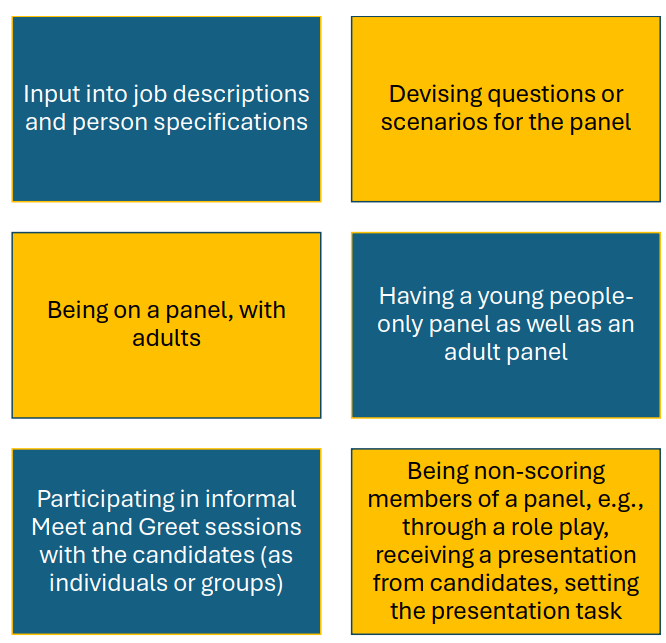In 2025, Coventry's Strong Voices group came together to create a guide for involving children and young people in recruitment processes. It was recognised that getting the right people for jobs that worked directly with young people would benefit from active participation by young people themselves, bringing with it benefits for all involved.
The final guide can be downloaded in pdf format [https://www.thechypshop.co.uk/downloads/download/1/involving-children-and-young-people-in-recruitment], and was split into 3 main categories:
What skills do we want to see in people supporting young people?
Someone who:
- Explains things well
- Is responsible and reliable (good at managing their time)
- is caring and empathetic (thinking about others)
- is good at banter and having a laugh
- is firm but fair
- can think on their feet
- is hands on
- has experience but enthusiasm is key
- is engaging and energised
- has excellent listening skills
- can explain things in a confident and clear way.
- shows teamwork with other staff and those they are supporting.
How can young people support with recruitment?
The most important part of meaningful involvement requires absolute clarity about the role young people have.
It is important that the professionals and young people are absolutely clear about the role and weighting of the panel members, as well as the level of decision-making and that this is agreed at the beginning of the process.
Once everyone is clear of the level of involvement, its time to decide what that involvement will look like. There are a range of options for involving children and young people in recruitment and selection of staff, such as the following

- Input into job descriptions and person specifications
- Devising questions or scenarios for the panel
- Being on a panel, with adults
- Having a young people only panel as well as an adult panel
- Participating in informal Meet and Greet sessions with the candidates (as individuals or groups)
- Being non-scoring members of a panel, e.g., through a role play, receiving a presentation from candidates, setting the presentation task
Depending on your setting, or the role you are recruiting to, some of the suggestions may be more suitable than others. It will be useful to consider the options with your young people and adults involved in the recruitment.
What are the benefits of involving children and young people?
Benefits for young people
- It can help develop skills, knowledge and experience for the future, as well as the present, and it can increase young people’s sense of purpose, self-esteem and confidence.
- It provides the opportunity to learn and use new skills, such as team work, negotiation, communication and decision making.
- It can also promote better relationships between young people and those with staff in school, through a sense of partnership and belonging. Stronger relationships between pupils and staff can have multiple benefits in developing trust and a sense of teamwork.
- It can help young people to develop their own interview skills by being on the “opposite side of the desk”
- It provides an opportunity to gain recognition for a job well done – and include on CV’s, job/college applications or achievement records.
Benefits for candidates
- They will get an idea of the students who they would be working with and understand the type of “vibe” the setting has.
- It may ensure that they are more relaxed and able to give a better representation of themselves and demonstrate their skills, especially if it is a practical activity with young people.
Benefits for the organisation/setting
- A more child/young person-led approach will help to strengthen the interview process and lead to better recruitment. Seeing how potential recruits interact gives better insight into their suitability for the setting.
- Better recruitment = improved outcomes for children and young people
- Sends a positive message to those accessing the setting, (pupils, staff, potential recruits, inspectors) that it is a setting which values the involvement of young people, and places them at the heart of decision making

